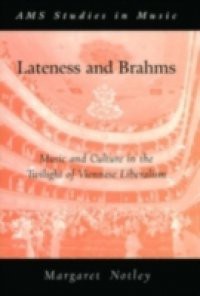Lateness and Brahms takes up the fascinating, yet understudied problem of how Brahms fits into the culture of turn-of-the-century Vienna. Brahms's conspicuous and puzzling absence in previous scholarly accounts of the time and place raises important questions, and as Margaret Notley demonstrates, the tendency to view him in neutralized, ahistorical terms has made his music seem far less interesting than it truly is. In pursuit of an historical Brahms, Notley focuses on the later chamber music, drawing on various documents and perspectives, but with particular emphasis on the relevance of Western Marxist critical traditions.



























